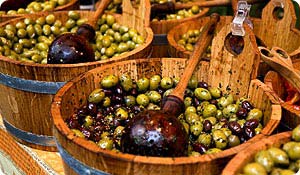
Olives are fruits that grow on trees. They contain a pit, and their flesh is filled with oil. Fresh olives, taken right off of the tree, taste bitter and are therefore cured for eating or pressed to extract the olive oil. Green and black olives come from the same tree and are actually the same olive at different stages of ripeness. Black olives are the most ripe.
Olives and olive oil are hallmarks of the heart-healthy Mediterranean diet. According to the Mayo Clinic, the Mediterranean diet emphasizes using olive oil as your primary source of fat, rather than animal or dairy fats. People eating a Mediterranean diet are found to have a lower incidence of heart disease.
Olives are considered a powerhouse food because they are high in monounsaturated fats and a beneficial compound called oleocanthal. Monounsaturated fats have been shown to help reduce artery-clogging "bad" LDL cholesterol levels when used in place of equally damaging saturated or trans fats. According to Registered Dietitian, David Grotto, in his book 101 Foods That Could Save Your Life, oleocanthal has been shown to have strong anti-inflammatory action to fight heart disease and cancer.
"Extra-virgin" and "virgin" olive oils are the least processed forms and contain the highest levels of the protective plant compounds that provide antioxidant effects.
Olives are packed in a light brine solution, not only to bring out the flavor of the fruit, but also to protect them in transportation. The recommended shelf life for unopened cans is 36-48 months. They may be stored at room temperature.
Once opened, it is recommended to store unused California ripe olives in their original brine in the open can and cover with plastic wrap to allow oxygen to permeate. If the container is to airtight, harmful toxins may develop. If the original brine has been discarded, replace with a solution of one cup of water and 1/2 teaspoon salt in order to keep the olives wet and free from external odors. Partially used cans of California ripe olives may be held in the refrigerator for up to ten days.
According to a recent study published in the June 23 online issue of BMJ, researchers at the University of Athens Medical School link a longer life to consuming large quantities of vegetables, fruits, nuts legumes and olive oil and keeping alcohol intake moderate and avoiding too much meat. Looking at individual components of the Mediterranean diet, a diet rich in vegetables and olive oil showed health benefits.
Sources:
1. www.bmj.com
3.101 Foods That Could Save Your Life by David Grotto, RD, LDN, Bantam Books, NY, 2008.





